
(完整)初中英语动词时态专项练习题.doc
- 格式:doc
- 大小:202.52 KB
- 文档页数:5


时态的基本判定方式:
一、时间状语同时态的关系:一般情况下,简单句可根据句中的时间状语确定谓语动词的时态。其判定方式如
下:
1、句中含有yesterday; last year( last + 具体时间) ; two days ago(一段时间+ ago); just now; this morning; in 2008 (in + 过去的年代) ; the other day; over the weekend 等时间状语时,谓语动词用一般过去时;
2、句中含有 tomorrow; next week ( next + 具体时间) ; in two hours ( in +一段时间) ; (how) soon; from now on; 10 years from now (一段时间 +from now ) ; in the future; in 2012 ( in +将来的年代) ; by (the end of) next month ( by+ 将来时间) ; for the weekend; this afternoon; this evening; tonight; this weekend 等时间状语时,谓语动词用一般将来时;
3、句中既有yesterday 等过去时间状语,又有一个具体时间点(at 5:00; this time; at that time)时,谓语动词用
过去进行时;
4、句中含有recently; in the last/past two years ( in the last/past+ 一段时间) ; over the years( over the+ 一段时间) ;
since 2005(since+具体时间或从句) ; for two years (for+ 一段时间,句中无其它时间状语) ; before(单独用于句尾)等时间状语时,谓语动词用现在完成时;
5、by (the end of) last year ( by+过去时间) ; two days before (一段时间 +before ); for 和 since 说明的时间同时用
于句中 ;by the time + 从句(过去时态)等时间状语时,谓语动词用过去完成时;
6、简单句中如不含上述时间状语或有含说话时间在内的表示现在时间关系的词语时(如now; today; these days 等词),其时态的判定一般按以下步骤进行:
------ 句中是否含有表示频率关系的词。如有,用一般现在时;
------ 句子是否说明客观规律。如是,用一般现在时;
------ 句中动词是否表示状况。如是,用一般现在时;
------ 句中动词是否为延续性动态动词。如是,用现在进行时;
------ 句中动词是否为完成性动词(瞬间动词)。如是,用现在完成时。
二、主从句时态的一致性原则:主从复合句可根据其时态一致性原则,通过主从句中任意一个句子的时态确定
另外一个句子的时态;含有时间状语从句的主从句还可通过其引导词所表示的不同时间关系,确定主句和从句
的时态。
三、通过上下文关系判定时态:另外我们还可以根据并列谓语的时态一致性原则、问句和答语的时态一致关系、无转折时间的短文时态一致原则等上下文时态的关联以及句子的逻辑关系来判定句子中谓语动词的时态。
Exercise
( )1. What _____ you _____ over the weekend?
A. will; do
B. does; do
C. did; do
D. were,; doing
( )2. Xiao Li usually _____ to school by bike last year.
A. goes
B. went
C. will go
D. is going
( )3. What _____ in our town 100 years from now?
A. happened
B. is happened
C. has happened
D. will happen
( )4. Mr. Smith _____ to see you in an hour.
A. came
B. has come
C. will come
D. comes
( )5. _____ you _____ from your parents recently?
A. Did; hear
B. Have; heard
C. Do; hear
D. Will; hear
( )6. We _____ TV at home this time last night.
A. were watching
B. watched
C. have watched
D. would watch
( )7. We _____ over 1500 English words by the end of last month.
A. have learned
B. had learned
C. will learn
D. learnt
( )8. She _____ in Shanghai for ten years since 1992.
A. has lived
B. had lived
C. lived
D. will live
( )9. She _____ in Shanghai for ten years.
A. has lived
B. had lived
C. lived
D. will live